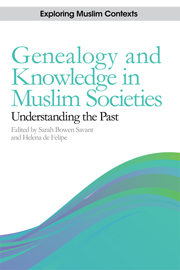Book contents
- Frontmatter
- Contents
- List of Figures and Tables
- Introduction
- Part One The Generation of Genealogical Knowledge
- Part Two Empowering Political and Religious Elites
- 4 Berber Leadership and Genealogical Legitimacy: The Almoravid Case
- 5 Ways of Connecting with the Past: Genealogies in Nasrid Granada
- 6 Embarrassing Cousins: Genealogical Conundrums in the Central Sahara
- Part Three Genealogy as a Source for Writing History
- About the Contributors
- Index
5 - Ways of Connecting with the Past: Genealogies in Nasrid Granada
from Part Two - Empowering Political and Religious Elites
Published online by Cambridge University Press: 05 September 2014
- Frontmatter
- Contents
- List of Figures and Tables
- Introduction
- Part One The Generation of Genealogical Knowledge
- Part Two Empowering Political and Religious Elites
- 4 Berber Leadership and Genealogical Legitimacy: The Almoravid Case
- 5 Ways of Connecting with the Past: Genealogies in Nasrid Granada
- 6 Embarrassing Cousins: Genealogical Conundrums in the Central Sahara
- Part Three Genealogy as a Source for Writing History
- About the Contributors
- Index
Summary
Could al-Andalus be Saved from the Christians?
Fear and Hope in Eschatological Traditions
The Malagan jurist al-Fakhkhar (d. 723/1323) compiled a number of eschatological traditions that addressed the dangers that Muslims had to face in al-Andalus. His was an age – the Nasrid period (seventh/thirteenth–ninth/fifteenth centuries) – when Muslim rule was reduced to a small area around the city of Granada, after the loss of a major part of the territory where formerly the Arabic language and Islam had predominated. Al-Fakhkhar's eschatological traditions could be understood as having been fabricated ad hoc to help the Andalusis face their predicament. However, they can be proven to be old traditions, some of which had been circulating since very early times.
A man among the enemies of the Muslims of al-Andalus, called dhū l-‘urf, will gather a big group from among the tribes of polytheism. The Muslims living in al-Andalus will realise that their strength would not be sufficient to stop them [the polytheists, that is, the Christians], and for this reason the Muslims of al-Andalus will be obliged to escape. The strong among them will arrive in ships to Tangiers, while the weak among them will stay [in al-Andalus], together with a group [from among the strong] who will not have ships to cross [the sea]. … God will send them an eminent man (wa‘l) for whom God will open a path in the sea for him to cross. The people will understand and follow that man, crossing in his steps. Then, the sea will return to its former shape. The enemies will cross in ships in order to persecute the Muslims.
- Type
- Chapter
- Information
- Genealogy and Knowledge in Muslim SocietiesUnderstanding the Past, pp. 71 - 88Publisher: Edinburgh University PressPrint publication year: 2014

